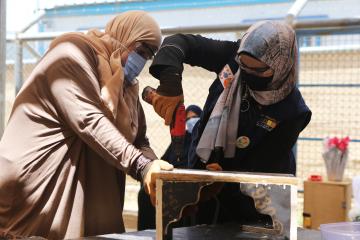
In conversation with Norwegian Church Aid: Understanding the catalyzing effect of J-PAL humanitarian trainings
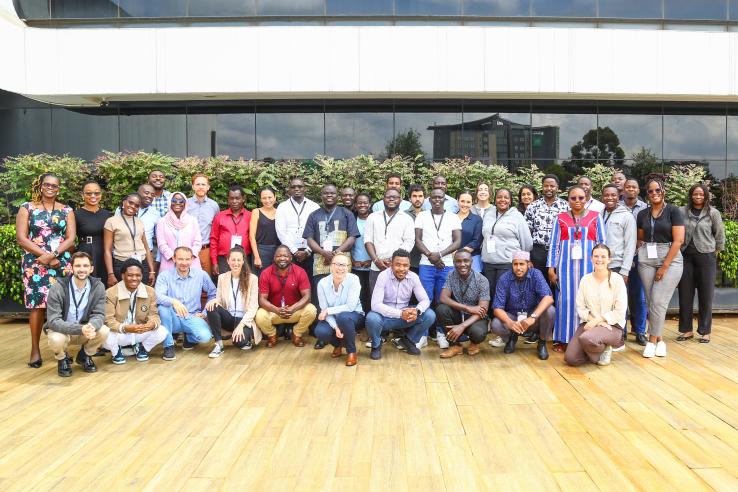
Photo credit: TEK Production
Africa is currently home to an estimated 40.4 million forcibly displaced individuals, including internally displaced persons, refugees, and asylum seekers—more than twice the number recorded in 2016 and nearly one-third of the global refugee population.
Since 2023, J-PAL and Innovations for Poverty Action (IPA), supported by the IKEA Foundation and the United Kingdom (UK) international development funding, have been conducting Humanitarian Action Research Incubators under the Displaced Livelihoods Initiative (DLI) and the Humanitarian Protection Initiative (HPI) to support project development across various regions. These incubators help organizations that are implementing humanitarian programs develop rigorous impact evaluations. Their programs typically involve the promotion of sustainable livelihoods for forcibly displaced individuals and host communities or programs that enhance protection outcomes in conflict settings. After hosting incubators focused on Europe, Latin America, and the MENA region, this November, the focus shifted to Sub-Saharan Africa, with an incubator held in Nairobi, Kenya, to bring together stakeholders from East Africa.
The incubator in Nairobi hosted ten implementing organizations, including evaluation staff, program implementers, and decision-makers. Over four days, participants deepened their understanding of ethical program evaluation in humanitarian contexts and acquired the knowledge and tools to design and evaluate their own programs. Local researchers were also invited to participate in the workshop to offer technical insights and foster collaboration.
Introducing Norwegian Church Aid (NCA) Somalia & the Center for Research and Integrated Development (CeRID)
On the third day of the incubator, J-PAL had the privilege of speaking with Norwegian Church Aid (NCA) Somalia and one of its key implementing partners in the country, the Centre for Research and Integrated Development (CeRID). NCA was represented by Deputy Country Director Ebulu George William along with Assad Osman, an M&E officer from CeRID. We engaged with the NCA team to understand their experience joining J-PAL's humanitarian trainings online and at the incubator, and how both have shaped their program evaluation goals. The NCA team shared the catalytic effect of joining the incubator, how it deepened their understanding of the complexities of randomized evaluations, and outlined their next steps to put this knowledge into action.
Somalia has long faced the challenge of being one of Africa's most conflict-affected countries. Since establishing its presence there in 1993, NCA has been committed to both emergency relief and long-term development solutions. Its mission is to foster a cohesive, peaceful, and resilient Somalia by empowering communities to participate in shaping public policies. In collaboration with local partners, such as CeRID, NCA aims to tackle these challenges by providing programs like vocational training for unemployed youth and survivors of Gender Based Violence (GBV), climate-smart economic empowerment projects, WASH (Water, Sanitation, and Hygiene) programs, safe spaces for women and girls who are or are at risk of becoming victims of violence, and peace building initiatives.
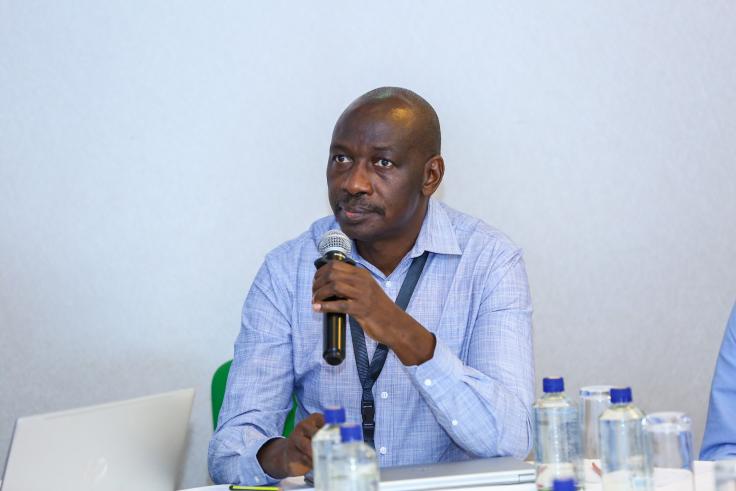
Photo: TEK Production
NCA’s motivations for joining the incubator
In our conversation, George and Assad stated that their primary goal in coming to the incubator was to work, in part, towards one of NCA’s key organizational goals for the next five years: to have a better sense of the impact of its programming by learning how to produce and use quality evidence. According to George, the best way to start down this path was to collaborate with organizations with the right expertise, like J-PAL.
George noted that he had been aware of J-PAL for some time and kept abreast of its work via social media. By doing so, he found out about an online Evaluating Social Programs workshop hosted by the Humanitarian Initiatives (HI) team which targeted organisations with programs aiming to improve protection outcomes. By joining this training, he was able to identify and present one of NCA Somalia's key learning goals: understanding the impact of a recurring vocational training program on livelihoods and protection outcomes. The opportunity enabled him to stay in touch with the HI team, who encouraged his team, along with Assad and CeRID, to apply to the in-person incubator in Nairobi to further workshop their evaluation idea. At the incubator, George took stock of the progression of his project’s collaboration with J-PAL:
“We are happy to see that the idea that we started with is now growing into a seed that will translate into projects that will feed into our long term goal of enhancing our capacity to produce quality evidence around the work that we do.”
George also noted the importance and relevance to the field of undertaking this work in Somalia: “There is not much mentioned in terms of studies in Somalia, despite all the work going on in the Horn of Africa. Somalia offers a very good context for studies like this, due to the protracted crises there. There is a lot to learn from these protracted situations.”
The incubator was particularly impactful for Assad at CeRID, a research organisation, in terms of encouraging more rigorous evaluation in Somalia: “It has motivated me to become a researcher because I know in Somalia, there are no researchers in our area of operation, and I think this is a field that has a lot of gaps to be filled. I hope that through our collaboration with J-PAL we can get the skills and exposure [to fill these gaps].”
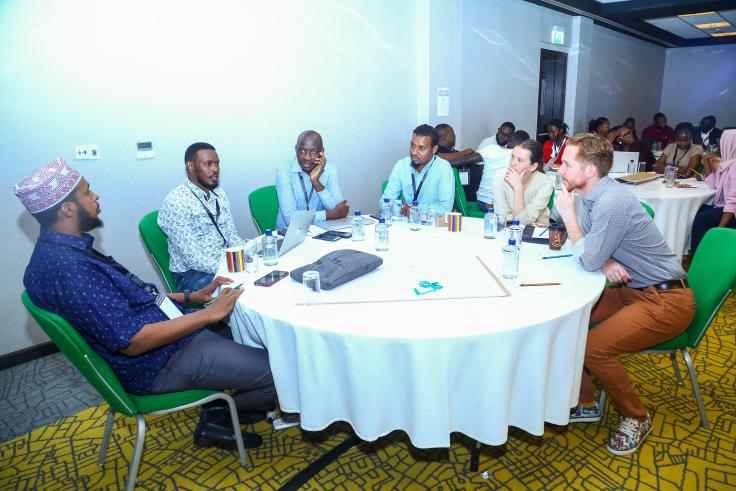
Photo credit: TEK Production
Working with experts to tackle the most complex aspects of randomized evaluation design
Research incubators aim to combine theory and practice, as well as allow projects to directly collaborate with researchers and experts in the field. Specifically, project teams have the opportunity to attend lectures on developing a research question, mapping a solid theory of change, selecting the right indicators to measure impact, identifying different approaches to randomization, and undertaking power calculations, among other topics. After each lecture, project teams work in small groups with researchers and J-PAL staff to apply what they learned to their own evaluation ideas—and receive feedback in real time.
As put by Assad, “I’ve appreciated the lectures given by experts in the field. They have been able to simplify such complex topics so well. It has also been great to have the opportunity to directly apply that knowledge to our own projects in the workshops dedicated to thinking through our own randomized evaluation design.”
When asked about the lecture sessions that were particularly salient to them, Assad and George agreed that the most technical sessions on randomization methods and determining sample size through power calculations were the ones that stuck with them the most. According to Assad, “Personally, the lecture presented by one of the researchers on randomization, in addition to the discussion with the researchers, has given me a clear direction of what we should do in the future to really capture the impact of our project.” George agreed, sharing, “I also appreciated the lecture on randomization as well as the session on power analysis because these are the technical areas that, if not handled well, could give you results that may or may not be accurate.”
At the end of our discussion, George reflected on his view of the pedagogical aspect of the incubator, the ability to interact with researchers and initiative staff directly, and the follow up needed to keep moving, saying, “Our questions are being answered at every step of the training, and we’re getting clarity on the methods and the approach, and with further collaboration and follow up, we hope to master it.”
Sharing knowledge to make a difference: NCA’s collaborative approach
As part of the global ACT Alliance, George highlighted NCA’s collaborative approach, working with national partners, including CeRID, to build local capacities for leading humanitarian responses and contributing to sustainable development. The ACT Alliance brings together national and international member organizations to form country-specific alliances and implement joint projects, much like a consortium working collaboratively to address humanitarian aid, gender and climate justice, migration, displacement, and peace.
For NCA and its partners, a central question drives their work: Are we making a difference in what we are doing? As a member of ACT Somalia, George is committed to sharing insights gained from the incubator with fellow alliance members. “It is our responsibility to learn together,” says George, emphasizing the importance of collective learning. Participants in J-PAL research incubators can play an important role in disseminating what they have learned on rigorous impact evaluation to colleagues and partners.
When it comes to evaluating impact, Somalia presents a unique context, especially given its protracted crises; however, impact evaluations of humanitarian programs in Somalia remain limited. Nonetheless, George sees great potential for change through increased collaboration and shared research efforts. By working together, NCA and its partners aim to not only address immediate needs in humanitarian crises but also build a foundation for long-term, evidence-based solutions.
What’s next?
The NCA team will continue collaborating with the HI team to be matched with a team of J-PAL affiliated researchers that will help evaluate one of NCA’s flagship programmes: improving economic opportunities for displaced youth in Somalia. The project design plans to explore long-term outcomes such as enhanced economic resilience and improved wellbeing for youth enrolled in a series of vocational and entrepreneurship skills training. The impact evaluation would produce learnings on a couple of different program modalities and delivery mechanisms, and assess the impact on long term outcomes.
Our next incubator is taking place in April 2025 in the Philippines in collaboration with IPA Philippines. This event will bring together implementing organizations from South Asia and Southeast Asia, with applications opening soon. In the face of complex humanitarian challenges, using evidence to guide decisions is more vital than ever. By integrating rigorous impact evaluations into humanitarian work, we not only measure what is effective but also uncover ways to maximize our impact and design cost effective programs. Impact evaluation isn’t just a tool—it’s a commitment to making every effort count.
Follow J-PAL Europe on LinkedIn to stay up-to-date on training and other opportunities and events through our humanitarian initiatives.
Related Content

New Humanitarian Protection Initiative will help reduce harm to people affected by conflict
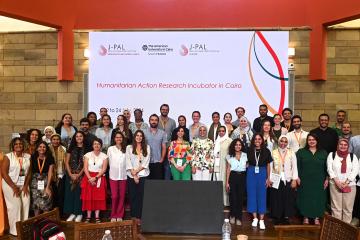
Driving evidence-based humanitarian action and displacement response in MENA




